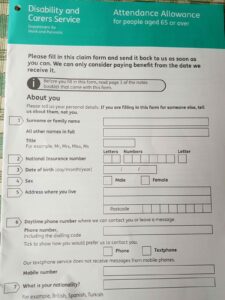Where do you start when something happens to a loved one and you have no idea where this will take you or how to prepare for it because things are constantly changing!?
What does the future look like, for them and for you? Sadly, this is the uncertainty that many face. It is so hard to prepare yourself for the unknown but there are things that you can be aware of that may help you to prepare regardless of the uncertain care needs.
Hospital Discharge
This will probably happen faster than you think. There may be moves along the way, – change of ward, rehabilitation, or a short period of respite to allow time to prepare a home or source care but the important thing is to ASK. Ask when, ask who, ask where, ask what. ASK WHY!
What does the future look like for care needs and care fees? When will my loved one be moved and where to, home, short or long-term care home needs? Who is responsible for making those arrangements? Who is paying and for how long?
Paying for care
If you are not eligible for NHS Continuing Healthcare funding and have over the Local Authority Charging upper funding level of £23,250 (England 2022/23) then you may be relying on the Local Authority to help you arrange the care but paying for it yourself or organising and paying for care on your own.
Paying for your own care
There may be more choice, but this is likely to come at a cost. The Local Authority may help you to find care and even arrange it for you regardless of who pays but if you are subject to a financial assessment the choice may be limited (although there must still be a choice) and you must meet their criteria.
Benefits
There are benefits that you may be able to claim, some are means tested but many are not. If you are older Attendance Allowance is the most common disability related non means tested benefit (if you are not already claiming another) but there may be some help with Council tax bills and a means tested top up may also be relevant now the circumstances have changed.
Who makes the decisions?
You may or may not have a Power of Attorney (see here for types of Power of Attorney and how to apply) but when it comes to Health and Welfare decisions the medical professionals involved in the care will have a significant influence and the family will not have sole say IF A Best interest decision needs to be made. There may be a Living Will, a Do Not Resuscitate or other express wishes that will be considered and if there is a dispute the Court of Protection can be asked to decide but while you have capacity to make a decision, it is yours to make.
Who decides where you go or how the care is met?
This is largely down to who pays! If it’s the NHS and you are in Hospital, it is quite likely that you will be discharged as soon as ready with an initial period of care provided free of charge but this is not for long so be prepared to make your own arrangements or get some help from the Local Authority who may or may not have been made aware that you are in need.
Staying at home
Most people would rather be at home and every effort should be made to help that happen and with care and support early enough this can avoid a more significant need later or a breakdown in care because the main carer can no longer manage.
Unintentional emotional blackmail, refusing care and trying to cope on your own is often unsustainable and can lead to such enormous stress that it becomes unsafe.
Respite and moving into care
A period of respite can allow for adaptations to be made to a home or a main carer to recover from their own illness, but it may also be that respite leads to a permanent stay so be prepared to ask the uncomfortable money questions to ensure continuity of care and avoid a later move…
Are you paying for care that you shouldn’t be?
These are all things that we will discuss with you. Please get in touch or make an appointment for a Care Funding and Benefit Check.
Thank you for reading this weeks blog, The Uncertain Care Journey
If you would like some help please Get In Touch.
Care Navigators
(October 2023)






